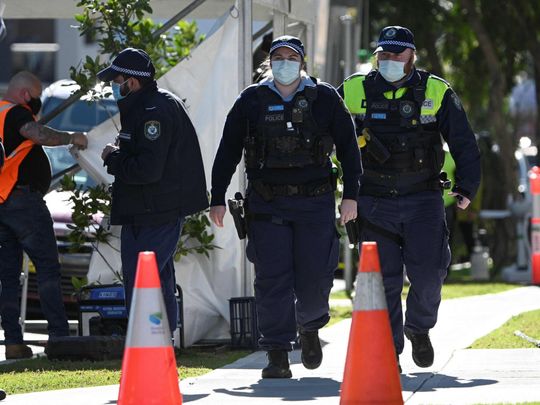
LONDON: There are early signs that people who have been vaccinated against COVID-19 may be able to transmit the Delta variant of the virus as easily as those who have not, scientists at Public Health England (PHE) said on Friday.
The findings chime with those from the US Centers for Disease Control and Prevention, which last week raised concerns that vaccinated people infected with Delta could, unlike with other variants, readily transmit it.
The highly infectious Delta variant has become the dominant coronavirus type globally, sustaining a pandemic that has already killed more than 4.4 million people, including over 130,000 in Britain.
Vaccines have been shown to provide good protection against severe disease and death from Delta, especially with two doses, but there is less data on whether vaccinated people can still transmit it to others.
“Some initial findings ... indicate that levels of virus in those who become infected with Delta having already been vaccinated may be similar to levels found in unvaccinated people,” PHE said in a statement.
“This may have implications for people’s infectiousness, whether they have been vaccinated or not. However, this is early exploratory analysis and further targeted studies are needed to confirm whether this is the case.” PHE said that of confirmed Delta cases that had ended up hospitalised since July 19, 55.1% were unvaccinated, while 34.9% had received two doses of a COVID-19 vaccine.
Nearly 75% of the British population has had two vaccine doses, and PHE said that “as more of the population gets vaccinated, we will see a higher relative percentage of vaccinated people in hospital”.
Separately, PHE said another variant, known as B.1.621, first detected in Colombia, had shown signs of evading the immune response triggered by either COVID-19 vaccines or previous infection.
PHE has labelled the variant “under investigation” but has not declared it a “variant of concern” - a designation that can trigger strong policy responses.
“There is preliminary laboratory evidence to suggest that vaccination and previous infection may be less effective at preventing infection with (B.1.621),” it said, adding there had been 37 confirmed cases of the variant in England.
Australian officials, meanwhile, warned Sydney residents to brace for a surge in COVID-19 cases after the country’s largest city logged record infections for the second straight day despite a weeks-long lockdown to stamp out an outbreak of Delta variant.
“Just based on the trend in the last few days and where things are going, I am expecting higher case numbers in the next few days and I just want everyone to be prepared for that,” New South Wales Premier Gladys Berejiklian told reporters in Sydney, the state capital.
Sydney reported a record 279 locally acquired cases of COVID-19 over the past 24 hours, up from the previous high of 259 the day before. New South Wales reported a record 291 cases, up from 262. One more person has died, raising the state total to 22 during the latest outbreak, all in Sydney.
The dead person was an unvaccinated woman in her 60s who died in a Sydney hospital after contracting the coronavirus from a healthcare worker. There are 304 cases in hospitals in New South Wales, with 50 people in intensive care, 22 of whom require ventilation.
Of particular concern is the growing number of people positive with the highly infectious Delta strain moving around in the community, particularly in Sydney’s southwestern suburbs.
Around one-fifth of Friday’s cases have spent time outside while infectious.
Officials in the neighbouring state of Victoria, which on Thursday night entered its sixth lockdown since the pandemic began, warned the state was “in a precarious position” as officials try to trace the source of several unlinked new cases.
“We have many lines of inquiry actively underway as to where these new cases have been and any further exposure sites,” state Health Minister Martin Foley said in a media conference.
Faced with another lockdown within weeks, an anti-lockdown protest erupted in state capital Melbourne on Thursday night.
Victoria reported six locally acquired COVID-19 cases on Friday, down from eight a day earlier, with all linked but not in quarantine during their infectious period.
In Brisbane, the state capital of Queensland, the authorities reported 10 new cases, down from 16 the day before, and added that they were hopeful a lockdown would be lifted as planned on Sunday since all but two cases were isolated before testing positive.
LOCKDOWN WOES
More than 60% of Australia’s 25 million citizens are in hard lockdowns on Friday to try to contain latest surge, including the country’s three largest cities - Sydney, Melbourne and Brisbane.
Snap lockdowns, strict border controls and swift contact tracing have helped Australia keep its coronavirus numbers relatively low, with just over 35,600 cases and 933 deaths. But recent stop-and-start lockdowns amid a sluggish vaccination rollout, with only about 21% of people above 16 fully vaccinated, have frustrated residents.
Australia has also enacted tough border controls requiring residents to apply for exemptions to leave and incoming overseas travellers, capped at around 3,000 a week, must go through a two-week mandatory quarantine.
The rules will further tighten from Aug. 11 by removing an automatic exemption for citizens and permanent residents living outside of Australia to leave, a government statement tabled in the parliament on Thursday showed.
The change would require all citizens and permanent residents living outside the country to apply for permission to exit.








